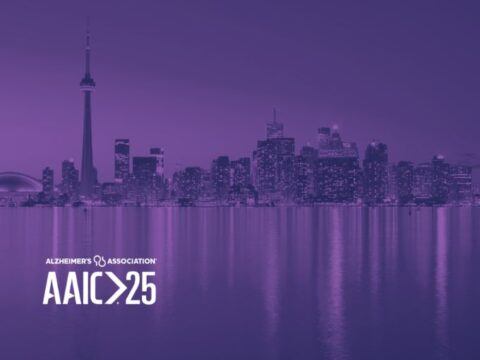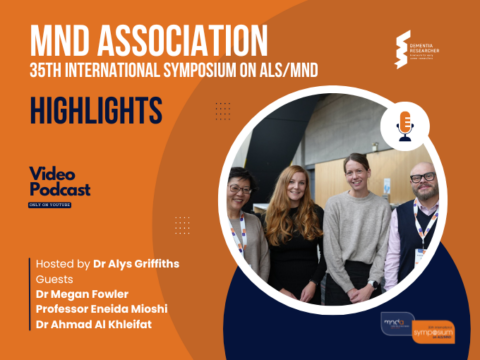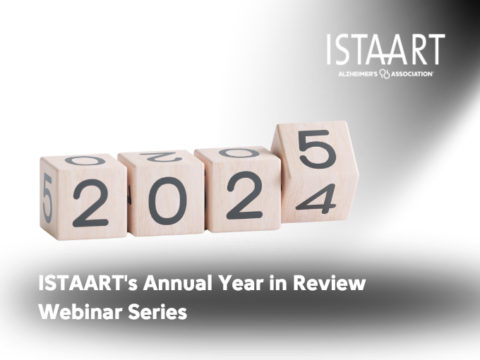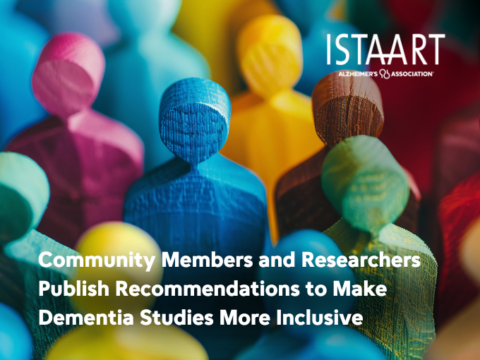A five-part special relay podcast series, where the interviewee becomes the interviewer. With five leading researchers discussing their research, their field, and the work of the Alzheimer’s Association ISTAART Professional Interest Area they represent.
Part Five – Dr Sietske Sikkes interviews Professor David Scott
Dr Sietske Sikkes is a Clinical Neuropsychologist and Epidemiologist and Assistant professor at the Alzheimer Centre Amsterdam at Amsterdam University Medical Centre & VU University, Netherlands. Sietske’s is researching Neuropsychology, cognition, instrument development, psychometrics and non-pharmacological interventions. She is representing the Non-pharmacological Interventions PIA and Subjective Cognitive Decline PIA.
David Scott is Director of the Department of Anaesthesia and Acute Pain Medicine, St. Vincent’s Hospital Melbourne and Professor, School of Medicine, University of Melbourne, Australia. David is researches Perioperative Neurocognitive Disorders – in particular, delirium and cognitive decline associated with anaesthesia and surgery. He is representing the Perioperative Cognition and Delirium PIA.
The Alzheimer’s Association International Society to Advance Alzheimer’s Research and Treatment (ISTAART) convenes the global Alzheimer’s and dementia science community. Members share knowledge, fuel collaboration and advance research to find more effective ways to detect, treat and prevent Alzheimer’s and other dementias. Professional Interest Areas (PIA) are an assembly of ISTAART members with common subspecialties or interests.
There are currently 25 PIA covering a wide range of interests and fields, from the Alliance of Women Alzheimer’s Researchers (AWARE) PIA to Biofluid Based Biomarkers and everything in between.
To sign-up to ISTAART and a PIA visit www.alz.org/istaart/
Adam Smith:
Hello, thank you for listening to our ISTAART PIA Relay podcast series, brought to you by NIHR Dementia Researcher. ISTAART is a professional society and part of the Alzheimer’s Association, representing scientists, physicians, and other dementia professionals active in researching and understanding the causes and treatments of Alzheimer’s disease and other dementias. In this five part series, we’ve asked members of ISTAART professional interest areas to take turns at interviewing their colleagues and being interviewed themselves.
Adam Smith:
Confused? Don’t worry. It’ll all become clear as the week progresses. We will be releasing one of these podcasts every day in the build-up to the Alzheimer’s Association International Virtual Conference, to showcase the work of ISTAART PIAs. Thank you for listening.
Dr Sietske Sikkes:
Hello everyone, and thanks for joining us through our final episodes. I am Dr Sietske Sikkes, and I’m an assistant professor at the Alzheimer’s Centre of the Amsterdam University Medical Centres. I chair the non-pharmacological interventions PIA, and I’m also a part of the subjective cognitive decline PIA. Today, I am very delighted to be speaking to Professor David Scott. Welcome. David. Can I start by asking you to introduce yourself and tell us in which PI you are involved?
Professor David Scott:
Hi, Sietske. Thanks very much for taking the time to talk with me and to talk about my PIA. My name is David Scott. I’m a professor of anaesthesiology at the University of Melbourne and the head of the Department of Anaesthesia at St. Vincent’s Hospital in Melbourne. As you can guess, I am a clinical anaesthetist and an academic researcher into perioperative cognition, and that’s where our PIA comes in, as I’m the chair of the Perioperative Cognition and Delirium PIA.
Dr Sietske Sikkes:
Okay. Thank you. As [inaudible 00:00:02:18], I can imagine that you’re focus in the past couple of months was on providing critical care and not so much on doing research. I hope you’ve survived and are able to do some research as well. I wanted to ask you if you could start by telling a little bit about your research.
Professor David Scott:
Yeah, sure, Sietske. Look, it’s a bit of a story really, and I guess it reflects what led to the formation of our PIA. For a long time, and perhaps well easily for over a hundred years, people have recognised that sometimes people do not wake up right after they have had anaesthesia and surgery, typically older people. You’ll often hear the story, “Well, Mum was never the same after she had her surgery,” whether she had a hip done or whatever she had done. This went sort of un-investigated for decades. Then with the advent of the cardiac surgery, it became clearer that there were higher risk patients having more cognitive events, including delirium after surgery, but they were still studying in the context of anaesthesia research, rather than in the broader context of community psychology, geriatrics, or psychiatry.
Professor David Scott:
A lot of work went into looking at what was called postoperative cognitive dysfunction. From that, we decided in some of our work that when we were doing studies into patients, older patients, in collaboration with psychologists, assessing their cognitive function post-operative. It was apparent that many patients going into these procedures already had some degree of cognitive impairment. They had some baseline cognitive impairment. We called this preoperative cognitive impairment or some other sort of term related to the surgery, but in fact, it’s just what they had in the community. One of the highest risk group, of course, the patients who’ve got Alzheimer’s disease, or who’ve got mild cognitive impairment syndromes prior to that.
Professor David Scott:
We basically needed collaboration with other investigators in other fields. We were working in silos. The beauty of the PIA as it eventually formed, was that it brought together geriatricians, basic scientists, anaesthesiologists, academics, psychiatrists, a whole lot of people from a whole lot of countries. That was because I guess, hosted by the Alzheimer’s Association, that’s what it does. That’s what Alzheimer’s meetings are like. It’s a whole melange of different specialities and specialist groups. That’s the opportunity to bring all the way from basic science through to clinical practice. To cut a long story short, we started from a question of clinical practice, “Hey, my only mother has not been the same after her anaesthesia and surgery.” Well, what’s causing this and identifying that there’s an at risk population that you need better tools for investigating it.
Professor David Scott:
You need to be able to look into the mechanisms underlying it and try and identify what might be modifiable risk factors. That’s where we got into delirium, because delirium clearly is something well known to you and to almost all of the listeners. Delirium is a very clearly definable clinical entity. It’s defined in the DSM-IV, 5, and it can be measured by a number of screening tests as well as definitive testing. That again, this idea of delirium after anaesthesia and surgery fell into place as part of this trajectory, if you like, of cognitive decline or dysfunction after anaesthesia and surgery. That’s a very brief answer for you.
Dr Sietske Sikkes:
Well, thank you, David. That’s very fascinating. I was wondering with regards to the mechanisms, how it works with the pre-operative cognitive dysfunction and post operation dysfunction, whether they are separate, whether the anaesthesia is … what the effect is. Is it an accelerator or does it independently cause the cognitive impairments? I was wondering what your … It’s probably more complicated than one or the other, but I was wondering.
Professor David Scott:
It is a bit of both, but that’s a really important question and one which we’re wrestling with. It’s also, I guess, one of the things we which brought our basic scientists and Alzheimer’s research into this whole, because there is a lot of basic science looking at exposure of Alzheimer prone animals, for instance, as in the amyloid mice and rats to anaesthesia agents, such as volatile aesthetic agents and [inaudible 00:07:38] surgical procedures. It can be shown that in those animals, they have changes in their neuro pathology, which is accelerated by the exposure to the aesthetic agents.
Professor David Scott:
One of the hypotheses is that exposure to aesthetic agents may be an accelerant for neuro degeneration in some way. It’s like a detective story. We’re moving more into a balance now where there’s a predisposition, because you’ve already got some cognitive impairment which increases your vulnerability. That’s pretty clear. There may be something related to the anaesthesia and surgery, whether it’s neuro toxicity from anaesthesia agents, or more likely, much, much more likely the combination of the stress and the inflammatory response from the surgical and aesthetic exposure, particularly maybe the surgery, which then creates an exaggerated deterioration, if you like, neuro degeneration
Professor David Scott:
We have done some interesting biomarker work in collaboration with members of the Biofluid Biomarkers group, which has demonstrated that certain biomarkers of neuro degeneration increase after anaesthesia and surgery for a period of time. There is potential for understanding the mechanisms, but I would be the first to say we’re nowhere near being able to say what actually is the biochemical and neurochemical mechanism underlying something like delirium. You asked, “Are we accelerating it or are we just make it sort of follow its own trajectory?” There’s two things happening out there. You would know this from your own research into clinical archetypes and the clinical pathways of patients with Alzheimer’s and other neurodegenerative diseases, that sometimes it’s something like having an event happened that brings it to awareness that that person is only just barely coping in their own environment.
Professor David Scott:
In that case, the event, the fall, the fracture, the anaesthesia, and surgery. Yes, it’s stressful, but actually what it’s revealed is their underlying lack of reserve. There is this other question, well maybe if we modify that stress, we can improve the trajectory for some of these people.
Dr Sietske Sikkes:
Yeah. I think what you’re saying is indeed the revealing aspect of the surgical procedure. That’s indeed something that you often hear in clinical practice. Is it also that you apply this knowledge in your clinical practice back again?
Professor David Scott:
Well, yeah. With our group, the PIA has published a couple of white papers looking at both basic science and also clinical science and recommendations. We’ve worked with the Perioperative Brain Health Institute for the American Society of Anaesthesiologists, in producing some recommendations for care for patients, older patients, having anaesthesia and surgery as it is European groups as well. Basically I think we do know, all the things you can do to decrease delirium are good things to do. There’s lifestyle modifications, environmental modifications, there’s removing predisposing factors, there’s modifying precipitating factors.
Professor David Scott:
From anaesthesiology point of view, which is, I guess, where I come from at my core, there are things like avoiding certain drugs, such as benzodiazepines, avoiding pain, avoiding exposure to anticholinergic drugs or analgesics, which increase sedation, creating a familiar environment, try to avoid metabolic disturbance and maybe even, maybe even modifying the depth of anaesthesia so that you’re minimising the dose of aesthetic that you give to these older patients. Now there’s conflicting evidence at the moment regarding some of the tools we use for measuring them.
Professor David Scott:
There’s plenty of scope for new investigators to get into this field because there’s so many unanswered questions, but we use a form of EEG monitoring, process EEG monitoring under [inaudible 00:11:52]. One of the form is called BIS, but there’s other types as well, entropy. They give us an index of how much the aesthetic agent is affecting the brain. It’s to do with the frontal parietal connect connectivity. We can, to some extent, dose adjust an acidic amount to older patients by noting the BIS, but it’s not designed for that. It’s a rough tool. At the moment that the jury is still out, I would say. The recommendations are that you minimise aesthetic dosing. That makes a lot of sense.
Professor David Scott:
But whether that tool in itself is the key, we’re still investigating, but there are so many other things we can do. There’s regional anaesthesia versus general anaesthesia, but almost always when someone has a regional aesthetic, I’ll come back to the fractured neck or femur again, because that’s a typical situation. They might have a spinal aesthetic, but they might get some sedation as well. That clouds the whole clinical pathway. That’s where ortho geriatrics really has come into its foray. I think it’s one of the best demonstrated effective perioperative ways of minimising adverse cognitive outcomes in elderly patients.
Dr Sietske Sikkes:
I think it sounds like a very broad research field in itself, and it’s really fascinating, but very difficult to oversee the consequences of indeed minimising the medication people receive. Yeah. I’m also thinking about pain perception and how people can communicate pain, for example, especially in the Alzheimer’s disease stage and the dementia stage. Yeah.
Professor David Scott:
Yeah. I mean, you’ve hit the nail on the head, in fact. That’s where the human side of it comes in. You need to have people who know that person who are able to communicate effectively with them, when they’re that extreme. The Alzheimer’s, the advanced Alzheimer’s disease is obviously a very challenging situation for patients and their families and carers and for clinicians trying to care for them, but I guess what we really want to do is to alter that trajectory, altar the path. Try and stop people getting so much outside of this disease. That’s what Alzheimer’s Association is all about and that’s what we’re all working towards. I know you’ve done some work, I think, into almost cognitive preconditioning or try to enrich the person’s mind or brain before, to see if that improves their trajectory. Is that a correct thing to say, Sietske?
Dr Sietske Sikkes:
Yeah. Yeah. We looked a little bit into the nonpharmacological intervention of sort of lifestyle changes and specifically for those people who experience complaints, memory complaints, because often these people would like to do something about their cognitive functioning. We give them some general lifestyle advice, but with this project, we really wanted to develop targeted lifestyle advice. Yeah, I think that’s quite key in giving lifestyle advice and hoping that people will improve, is that it is targeted.
Professor David Scott:
That fits in with exactly some of the research that our founding chair of our PIA was Professor Lis Evered. Currently she’s at Weill Cornell, but she actually works in my department in Melbourne as well. She’s got a research program which is just starting up now. It’s been stopped because of the COVID situation that we all needed to right at the start. Basically, it’s to do with all those sorts of psychological pre knowledge and mind improvement prior to anaesthesia and surgery, to see if that conditions you, protect you against the stress.
Professor David Scott:
We’ve heard of physical preconditioning before surgery, this is cognitive preconditioning if you like. She uses the term cognitive prehabilitation. We’re hoping that that’s exactly what I think you’re talking about and maybe you two should get together and talk.
Dr Sietske Sikkes:
Yeah, exactly, exactly. That sounds like a perfect match actually. It does.
Professor David Scott:
The challenge of COVID and one of the problems we have as researchers in clinical practice is, you’ve got to sit down with patients and do assessments on them. At the moment that’s a touchy area. People don’t want researchers coming into their homes or [crosstalk 00:16:57] down with them for 15 minutes, or half an hour, or an hour and a half doing a psychological screening thing. We’ve actually had to stop some of that assessment. [crosstalk 00:17:06] ways it might be able to be done remotely. Remote assessment is something which is emerging I think.
Dr Sietske Sikkes:
Yeah, yeah. I have always been in favour of remote assessments as an add on, so to say, but it was very difficult to convince people about the needs. Now of course, it’s completely clear. We need remote assessments, even if it is just to follow people over time, to have some idea about how they’re functioning whilst not being able to visit them. It is. It is of course, it provides so many opportunities to do remote assessments. People can do that on their own computer, or even on their own mobile phone. You can capture a lot of data about how they’re functioning. It is definitely an area that I think a lot of people now see the value of and the urgency to work on.
Professor David Scott:
Yeah. We’ve been motivated to do a lot of things a lot more quickly in different ways since we’ve had the limitations put on this, haven’t we?
Dr Sietske Sikkes:
Yes. Yes. For sure. Yeah.
Professor David Scott:
It was very important. The meeting was cancelled, for instance. I’m sure everyone was hoping to come to Amsterdam this year for [crosstalk 00:18:31].
Dr Sietske Sikkes:
Yes. Yeah. That’s very unfortunate. I was actually looking forward to being a Van Gogh Museum tour guide, but unfortunately that’s also not happening. We’re very sad that you all won’t be coming to Amsterdam this year, but hopefully next time.
Professor David Scott:
Hopefully soon.
Dr Sietske Sikkes:
Yeah. I was also wondering whether in the PIA you also have early career researchers involved, and/or how they can get involved in your PIA.
Professor David Scott:
Yeah. I think one of the beauties of the PIAs is that their third [inaudible 00:00:19:13], early career researchers to make context, to make connections, to get involved. There’s a whole lot of different ways. Of course, joining the PIA is a good thing through ISTAART, putting in abstracts and tagging them for the PIA. What we did last year, we had a couple of people who we didn’t know who had tagged our PIA as part of their submission through AAIC. We invited them to present their work at our PIA day, as you know, brief, abstract presentations, which was a great way of getting to know younger researchers and for them to get to network with a whole range of people from, as I said, from basic scientists all the way through to clinicians of varying different specialities and expertise.
Professor David Scott:
Certainly putting an abstract, tagging the PIA is a great way. Everyone’s … is equal. There’s no sort of academic hierarchy, I think within the PIAs. It’s just the people who work together and can talk in a room and go out to dinner. There are PIA wide advertised webinars, which are held every year or so. We’ve not been that good this year. We had one last year, but we haven’t had one this year yet. Of course, we will be having both the live webinar following the AAIC meeting, as well as these pre-recorded and pre-recorded sessions as well. I think [inaudible 00:20:44] is probably doing the same things. [crosstalk 00:20:47].
Dr Sietske Sikkes:
Both of them. Yeah, but good. There will be a pre-recorded session that people can [crosstalk 00:20:55].
Professor David Scott:
Yeah. Yeah. Our PIA Perioperative Condition Delirium PIA work is putting together what I think is a great pre-recorded program. We’ll also have a live program for later on where people can interrupt, with people who are registered with ISTAART. As I understand it, the pre-record is going to be widely available for anyone, but you need to be registered for the live session. Yeah. The other thing is we do offer travel grants for younger investigators, young investigator awards, and we advertise for those.
Professor David Scott:
We couldn’t really offer a travel grant this year because no one’s travelling anywhere. Maybe it’ll double in value for next year. I don’t know. We’re wide open to people just joining and [inaudible 00:21:46] and watching what we do, looking up researchers in their own area and coming along obviously to the ISTAART PIA day.
Dr Sietske Sikkes:
Yeah. That’s an excellent initiative, so with the fellowship, people can join who otherwise wouldn’t be able to attend the conference. I think that’s really great. Okay. Well I think it’s our time is up, so thank you. Before we go, I have one final question. I actually thought this was the most tricky question, but what advice would you give to any aspiring scientists out there who are thinking of looking into dementia?
Professor David Scott:
That is a hard question and I should have been prepared for it. Look, I think looking into dementia, it’s so wide ranging. It’s so important that it affects people at all stages of the disease, from mild cognitive impairment all the way through. I think the area to look at is in the early forms of the illness, to look at, if you’re looking at clinical patients, patients who are just starting to get memory complaints or have mild cognitive impairment. I think that’s a fertile area for research. Clearly we want to do what we can to halt or even reverse more advanced dementia, but if you look at the analogy with cardiovascular disease, we achieve a lot more by preventive strategies and in fact, strategies which improve the cardiovascular system, improve the brain as well and cognition.
Professor David Scott:
Prevention, stopping it before the disease starts, before you have your heart attack, before you have your brain attack or your delirium, those sorts of things I think are worth targeting. Delirium, I think, is worth targeting as well. I think that’s a very important area, probably because not only is it a manifestation of some degree of cognitive challenge, but also an episode delirium probably does some harm. It’s likely that any strategies which can be done to prevent delirium will be of benefit. You can be the basic scientist who discovers the underlying mechanism for delirium and you can turn it off. Then that would be fantastic.
Dr Sietske Sikkes:
Yeah. That’s an open invitation to all early career researchers. I would like to thank you very much, David. It was a pleasure talking to you and thank you for listening.
Adam Smith:
Thank you so much for listening over the past week. ISTAART PIAs are a great way to expand your network and find new collaborators, and we hope these podcasts have inspired you to become involved. You will find profiles on today’s panellists and information on ISTAART, on our website at dementiaresearcher.nihr.ac.uk, and alz.org/ISTAART.
Adam Smith:
We’re looking forward to next week’s AAIC virtual conference, so if you haven’t already registered, visit alz.org for more information. Finally, please remember to like, subscribe, and leave a review of our podcast on iTunes, Spotify, our website, and everywhere else you find your podcasts. Thank you again for listening.
END
Like what you hear? Please review, like, and share our podcast – and don’t forget to subscribe to ensure you never miss an episode.
If you would like to share your own experiences or discuss your research in a blog or on a podcast, drop us a line to adam.smith@nihr.ac.uk or find us on twitter @dem_researcher
You can find our podcast on iTunes, SoundCloud and Spotify and where ever you get your podcasts.
Finally, the views and opinions expressed by guests in this podcast represent those of the guests and do not necessarily reflect those of NIHR Dementia Researchers, PIA membership, ISTAART or the Alzheimer’s Association.

 Print This Post
Print This Post





